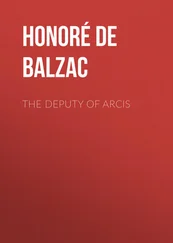“Eh! poor boy, and he’s sleeping like the king of the world!” said Nanon in a gentle voice.
Eugenie stopped eating. Her heart was wrung, as the young heart is wrung when pity for the suffering of one she loves overflows, for the first time, the whole being of a woman. The poor girl wept.
“What are you crying about? You didn’t know your uncle,” said her father, giving her one of those hungry tigerish looks he doubtless threw upon his piles of gold.
“But, monsieur,” said Nanon, “who wouldn’t feel pity for the poor young man, sleeping there like a wooden shoe, without knowing what’s coming?”
“I didn’t speak to you, Nanon. Hold your tongue!”
Eugenie learned at that moment that the woman who loves must be able to hide her feelings. She did not answer.
“You will say nothing to him about it, Ma’ame Grandet, till I return,” said the old man. “I have to go and straighten the line of my hedge along the high-road. I shall be back at noon, in time for the second breakfast, and then I will talk with my nephew about his affairs. As for you, Mademoiselle Eugenie, if it is for that dandy you are crying, that’s enough, child. He’s going off like a shot to the Indies. You will never see him again.”
The father took his gloves from the brim of his hat, put them on with his usual composure, pushed them in place by shoving the fingers of both hands together, and went out.
“Mamma, I am suffocating!” cried Eugenie when she was alone with her mother; “I have never suffered like this.”
Madame Grandet, seeing that she turned pale, opened the window and let her breathe fresh air.
“I feel better!” said Eugenie after a moment.
This nervous excitement in a nature hitherto, to all appearance, calm and cold, reacted on Madame Grandet; she looked at her daughter with the sympathetic intuition with which mothers are gifted for the objects of their tenderness, and guessed all. In truth the life of the Hungarian sisters, bound together by a freak of nature, could scarcely have been more intimate than that of Eugenie and her mother,—always together in the embrasure of that window, and sleeping together in the same atmosphere.
“My poor child!” said Madame Grandet, taking Eugenie’s head and laying it upon her bosom.
At these words the young girl raised her head, questioned her mother by a look, and seemed to search out her inmost thought.
“Why send him to the Indies?” she said. “If he is unhappy, ought he not to stay with us? Is he not our nearest relation?”
“Yes, my child, it seems natural; but your father has his reasons: we must respect them.”
The mother and daughter sat down in silence, the former upon her raised seat, the latter in her little armchair, and both took up their work. Swelling with gratitude for the full heart-understanding her mother had given her, Eugenie kissed the dear hand, saying,—
“How good you are, my kind mamma!”
The words sent a glow of light into the motherly face, worn and blighted as it was by many sorrows.
“You like him?” asked Eugenie.
Madame Grandet only smiled in reply. Then, after a moment’s silence, she said in a low voice: “Do you love him already? That is wrong.”
“Wrong?” said Eugenie. “Why is it wrong? You are pleased with him, Nanon is pleased with him; why should he not please me? Come, mamma, let us set the table for his breakfast.”
She threw down her work, and her mother did the same, saying, “Foolish child!” But she sanctioned the child’s folly by sharing it. Eugenie called Nanon.
“What do you want now, mademoiselle?”
“Nanon, can we have cream by midday?”
“Ah! midday, to be sure you can,” answered the old servant.
“Well, let him have his coffee very strong; I heard Monsieur des Grassins say that they make the coffee very strong in Paris. Put in a great deal.”
“Where am I to get it?”
“Buy some.”
“Suppose monsieur meets me?”
“He has gone to his fields.”
“I’ll run, then. But Monsieur Fessard asked me yesterday if the Magi had come to stay with us when I bought the wax candle. All the town will know our goings-on.”
“If your father finds it out,” said Madame Grandet, “he is capable of beating us.”
“Well, let him beat us; we will take his blows on our knees.”
Madame Grandet for all answer raised her eyes to heaven. Nanon put on her hood and went off. Eugenie got out some clean table-linen, and went to fetch a few bunches of grapes which she had amused herself by hanging on a string across the attic; she walked softly along the corridor, so as not to waken her cousin, and she could not help listening at the door to his quiet breathing.
“Sorrow is watching while he sleeps,” she thought.
She took the freshest vine-leaves and arranged her dish of grapes as coquettishly as a practised house-keeper might have done, and placed it triumphantly on the table. She laid hands on the pears counted out by her father, and piled them in a pyramid mixed with leaves. She went and came, and skipped and ran. She would have liked to lay under contribution everything in her father’s house; but the keys were in his pocket. Nanon came back with two fresh eggs. At sight of them Eugenie almost hugged her round the neck.
“The farmer from Lande had them in his basket. I asked him for them, and he gave them to me, the darling, for nothing, as an attention!”
Table of Contents
After two hours’ thought and care, during which Eugenie jumped up twenty times from her work to see if the coffee were boiling, or to go and listen to the noise her cousin made in dressing, she succeeded in preparing a simple little breakfast, very inexpensive, but which, nevertheless, departed alarmingly from the inveterate customs of the house. The midday breakfast was always taken standing. Each took a slice of bread, a little fruit or some butter, and a glass of wine. As Eugenie looked at the table drawn up near the fire with an arm-chair placed before her cousin’s plate, at the two dishes of fruit, the egg-cup, the bottle of white wine, the bread, and the sugar heaped up in a saucer, she trembled in all her limbs at the mere thought of the look her father would give her if he should come in at that moment. She glanced often at the clock to see if her cousin could breakfast before the master’s return.
“Don’t be troubled, Eugenie; if your father comes in, I will take it all upon myself,” said Madame Grandet.
Eugenie could not repress a tear.
“Oh, my good mother!” she cried, “I have never loved you enough.”
Charles, who had been tramping about his room for some time, singing to himself, now came down. Happily, it was only eleven o’clock. The true Parisian! he had put as much dandyism into his dress as if he were in the chateau of the noble lady then travelling in Scotland. He came into the room with the smiling, courteous manner so becoming to youth, which made Eugenie’s heart beat with mournful joy. He had taken the destruction of his castles in Anjou as a joke, and came up to his aunt gaily.
“Have you slept well, dear aunt? and you, too, my cousin?”
“Very well, monsieur; did you?” said Madame Grandet.
“I? perfectly.”
“You must be hungry, cousin,” said Eugenie; “will you take your seat?”
“I never breakfast before midday; I never get up till then. However, I fared so badly on the journey that I am glad to eat something at once. Besides—” here he pulled out the prettiest watch Breguet ever made. “Dear me! I am early, it is only eleven o’clock!”
“Early?” said Madame Grandet.
“Yes; but I wanted to put my things in order. Well, I shall be glad to have anything to eat,—anything, it doesn’t matter what, a chicken, a partridge.”
Читать дальше












